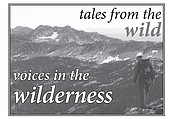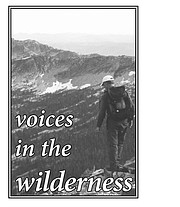The call of the wild
Despite being an avid hunter and living in northwest Montana my entire life, I went on my first hunting trip in the Scotchman Peaks area just two years ago.
My friend, Dan, and I had carved four days out of our busy work and family schedules to go archery hunting for elk and mule deer in this unique corner of Montana. Our plan was to carry our minimalist bivy-style camps with us while we hunted, so we could let the day’s events determine where our next night would be spent. As long as we had water nearby and a semi-flat site to pitch a small shelter we would be fine.
So on a cool Friday evening in mid-September we hiked six miles into a secluded basin, finally arriving at our campsite by headlamp. After gobbling down a quick, freeze-dried meal, we were more than ready to bed down for the night. Gazing up at the star-filled sky between the towering spruce and hemlock only increased my sense of wonder about this place and the animals that call it home.
The stars were still out as we rolled up our camp the next morning and readied ourselves for the day. As we moved up the ridge from camp at first light, old growth timber gave way to a more open canopy and very dense undergrowth. We waded through the brush, following barely visible game trails and occasionally stopping to cow call or bugle in hopes of locating some elk. Less than an hour into the morning, our calling produced a raspy reply from a bull just uphill from us in the direction we were traveling.
The bull’s tone indicated he was becoming increasingly interested in our calls. Within minutes, we could hear him coming down the hill. The five-by-five came to within 30 yards of me, offering no shot for several minutes. During the standoff, a second bull bugled from the direction of where the first one came.
Finally, the first bull offered me a shot, which I took full advantage of, sending him crashing through the tall brush and out of sight. A few more cow calls and the second bull was on the move. He charged down the hill, right past Dan, who put an arrow into his vitals.
Two bulls down within 10 minutes of one another—I couldn’t believe what had just happened.
We knew a daunting task lay ahead of us. To butcher and pack one mature bull elk out of the backcountry is a big job. Having two of them on the ground sent us into a panicked frenzy of butchering and preparing the meat to cool. Committed to doing everything we could to make sure the meat was saved, we hung our camping gear in a tree thinking we could come back for it later, after the meat was out.
By late afternoon, we were headed out with bone-crushing loads of meat on our backs. We arrived at the trailhead as light faded and started making phone calls.
Fortunately, we recruited enough help to get all the meat, and our camp, out the next day. The cool night temperatures had preserved the meat perfectly, leaving us with hundreds of pounds of organic protein to feed us through the next year.
It was the shortest hunt I’ll never forget.
This hunt was, by any measure, a success—especially in terms of efficiency of filling the freezer. But I found myself longing for something more out of the deal. I realized that I had missed out on the journey by finishing so quickly (and epically). The adventure had barely started when it ended. I needed more time in the backcountry to adjust from the speed of normal life to the slow pace of the wild. We chose this place to spend our cherished free time not only because of the elk and deer that live there, but because it’s a big, wild environ where we could wander for days and not hit a road or see another human.
It’s a place that has a certain allure to it, conjuring up emotions known perhaps to the mountain men and early explorers of the west. In this country, I can have an absolutely amazing hunting experience even without bringing home an animal.
I came to the realization that hunting, for me, is about far more than the killing of an animal. It’s the total experience. For me, and for many other hunters, the ultimate experience only happens in places like the Scotchman Peaks.
Probably my favorite quote about hunting comes from the Spanish philosopher Jose Ortega y Gasset who said, “One does not hunt in order to kill; on the contrary, one kills in order to have hunted ... If one were to present the sportsman with the death of the animal as a gift he would refuse it. What he is after is having to win it, to conquer the surly brute through his own effort and skill with all the extras that this carries with it: the immersion in the countryside, the healthfulness of the exercise, the distraction from his job.”
The more time I spend in wild places like the Scotchmans, the more thankful I become that these places continue to exist essentially untouched. Large tracks of wild, public land are a unique and very special resource.
It’s important that everyone who appreciates these places and experiences be involved in protecting them for future generations. Our children and grandchildren will be thankful that they have the opportunity to experience them as we have.
Voices in the Wilderness is a column written by people in the vicinity of the proposed Scotchman Peaks Wilderness. If you have an adventure tale based in untamed country (it doesn’t have to be local), write to sandy@scotchmanpeaks.org for guidelines, or just send it along.





